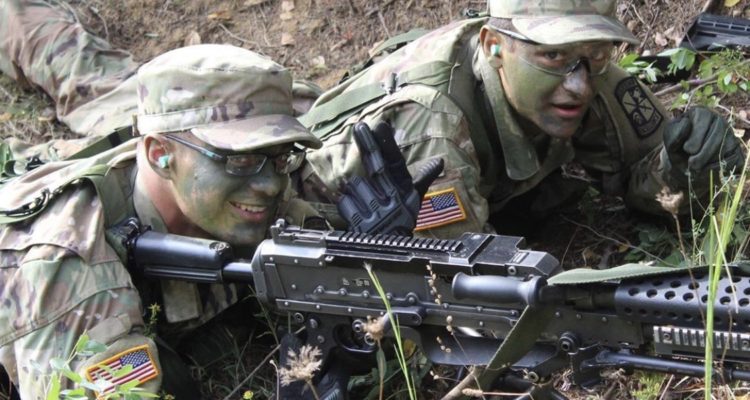By: Brentley Kalata
Bellarmine sophomore Paul Kotarski typically starts his day at 6 a.m. with physical training then follows it up with a full-time school and work schedule. ROTC Cadet Kotarski does this for his future military success.
Kotarski grew up in Elizabethtown, Kentucky, near Ft. Knox, where his father was stationed a while in the U.S. Army. This is where the younger Kotarski developed a passion for the military and becoming a leader.
Kotarski was a Boy Scout through grade school and high school. He also joined JROTC at John Harden High School in Rineyville, Kentucky.
“Both organizations taught me a lot about leadership and citizenship. I also developed skills like communication and teamwork,” he said.
The typical day in the life of Kotarski involves training in the morning followed by military science classes at the University of Louisville and a two-hour lab where ROTC members attend practical training at Louisville-area parks.
The training is cross-fit style with a heavy dose of high-intensity running. The practical training tends to be based on military strategy where cadets practice raids, assaults and land navigation. This is where cadets are tested on their strategic knowledge, planning and execution.
Being a part of a strenuous and time consuming program can cause demanding challenges. Kotarski said: “As far as difficulties, it’s just like any student-athlete, making sure I budget enough for sleep and studying, and I have a mandatory field exercise every semester where I have no access to school for an entire weekend, so I really have to prepare for that.”
Upon graduation Kotarski plans to receive a commission as a new Army officer. His future goals after the ROTC program include attending Army Ranger School. Ranger School is a two-month tactical training and leadership course in Ft. Benning, Georgia, where soldiers are trained for close combat and direct fire.
Michael Kotarski, Paul’s older brother said: “Inspired by my grandfather and father, my brother has always had the will and motivation to serve his country as a leader in the Army. He has worked hard his entire young life to achieve this goal. He is closer to it than ever by participating in ROTC.”
Kotarski has set personal goals for his time in ROTC as well as his time in the active duty Army. He plans to honor his family legacy by serving and plans to leave the Army with the rank of captain. As a commissioned officer with the rank of second lieutenant, which is what Kotarski will be after he receives his commission, he will earn a total compensation packaged of $66,024.18 per year. Kotarski said he doesn’t pay attention to salary, as he knows he will be gratified by his service.
Once on active duty, Kotarski will also receive training to advance through the ranks and have opportunities for post-graduate education.
Kotarski also has high aspirations of being a part of the 75th Ranger Regiment. The Ranger Regiment is an elite light infantry unit that is part of the U.S. Army Special Operations Command.
A benefit of joining the Army ROTC program is the scholarship to cut the costs of attending college. Career paths for officers within the Army include advanced training in one of 17 internal Army branches.
Although he’s a Bellarmine University student, Kotarski attends classes at the University of Louisville because Bellarmine has an agreement with U of L that allows him to do that.
Students can choose this path if the military is in their interest because the ROTC program is housed at the University of Louisville. Although the two schools cooperate on the program there are challenges with attending regular college classes at Bellarmine and completing ROTC training at U of L.
Fellow ROTC Cadet Johnathen Amaya said: “Being a student at Bellarmine and a cadet at U of L definitely demands certain time constraints. I sometimes feel like I am more of a part of U of L than Bellarmine with how much I study and train over there.”

